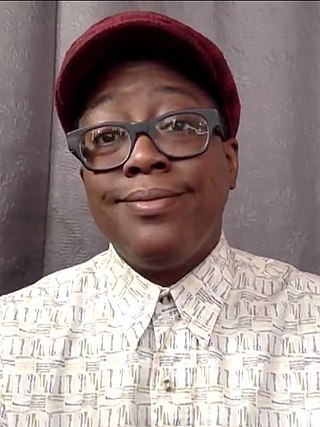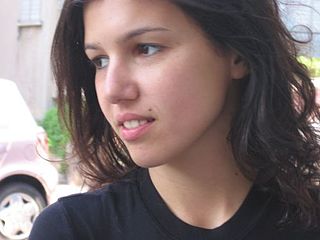Related Research Articles

Judy Chicago is an American feminist artist, art educator, and writer known for her large collaborative art installation pieces about birth and creation images, which examine the role of women in history and culture. During the 1970s, Chicago founded the first feminist art program in the United States at California State University, Fresno which acted as a catalyst for feminist art and art education during the 1970s. Her inclusion in hundreds of publications in various areas of the world showcases her influence in the worldwide art community. Additionally, many of her books have been published in other countries, making her work more accessible to international readers. Chicago's work incorporates a variety of artistic skills, such as needlework, counterbalanced with skills such as welding and pyrotechnics. Her most well-known work is The Dinner Party, which is permanently installed in the Elizabeth A. Sackler Center for Feminist Art at the Brooklyn Museum. The Dinner Party celebrates the accomplishments of women throughout history and is widely regarded as the first epic feminist artwork. Other notable art projects by Chicago include International Honor Quilt, Birth Project, Powerplay, and The Holocaust Project. She is represented by Jessica Silverman gallery.

Womanhouse was a feminist art installation and performance space organized by Judy Chicago and Miriam Schapiro, co-founders of the California Institute of the Arts (CalArts) Feminist Art Program and was the first public exhibition of art centered upon female empowerment. Chicago, Schapiro, their students, and women artists from the local community, including Faith Wilding, participated. Chicago and Schapiro encouraged their students to use consciousness-raising techniques to generate the content of the exhibition. Together, the students and professors worked to build an environment where women's conventional social roles could be shown, exaggerated, and subverted.

Barbara Jean Hammer was an American feminist film director, producer, writer, and cinematographer. She is known for being one of the pioneers of the lesbian film genre, and her career spanned over 50 years. Hammer is known for having created experimental films dealing with women's issues such as gender roles, lesbian relationships, coping with aging, and family life. She resided in New York City and Kerhonkson, New York, and taught each summer at the European Graduate School.
Karla Jay is a distinguished professor emerita at Pace University, where she taught English and directed the women's and gender studies program between 1974 and 2009. A pioneer in the field of lesbian and gay studies, she is widely published.

Gayle S. Rubin is an American cultural anthropologist, theorist and activist, best known for her pioneering work in feminist theory and queer studies.
Michelle Citron is a film, video and multimedia artist, scholar and author.
The Lesbian Sex Mafia (LSM) is an information and support group for bisexual women and lesbians interested in sexual activities involving BDSM, fetishes, costumes, etc. Founded in 1981 by Jo Arnone and Dorothy Allison, it is located in New York City.
Sheila Levrant de Bretteville is an American graphic designer, artist and educator whose work reflects her belief in the importance of feminist principles and user participation in graphic design. In 1990 she became the director of the Yale University Graduate Program in Graphic Design and the first woman to receive tenure at the Yale University School of Art. In 2010 she was named the Caroline M. Street Professor of Graphic Design.
Faith Wilding is a Paraguayan American multidisciplinary artist - which includes but is not limited to: watercolor, performance art, writing, crocheting, knitting, weaving, and digital art. She is also an author, educator, and activist widely known for her contribution to the progressive development of feminist art. She also fights for ecofeminism, genetics, cyberfeminism, and reproductive rights. Wilding is Professor Emerita of performance art at the School of the Art Institute of Chicago.

Cheryl Dunye is a Liberian-American film director, producer, screenwriter, editor and actress. Dunye's work often concerns themes of race, sexuality, and gender, particularly issues relating to black lesbians. She is known as the first out black lesbian to ever direct a feature film with her 1996 film The Watermelon Woman. She runs the production company Jingletown Films based in Oakland, California.
Su Friedrich is an American avant-garde film director, producer, writer, and cinematographer. She has been a leading figure in avant-garde filmmaking and a pivotal force in the establishment of Queer Cinema.
Midi Onodera is a Japanese-Canadian filmmaker. Onodera's works feature a collage of formats, from 16mm to Hi8 video and digital video to 'low end' digital toy formats, and address individual, collective, national and transnational identities.

Aviva Kempner is a German-born American filmmaker. Her documentaries investigate non-stereotypical images of Jews in history and focus on the untold stories of Jewish people. She is most well known for The Life and Times of Hank Greenberg.

Sharon Kleinbaum is an American rabbi who served as spiritual leader of New York City's Congregation Beit Simchat Torah for 32 years. She is now the synagogue's first Senior Rabbi Emerita. She has been an active campaigner for human rights and civil marriage for gay couples.
Amber L. Hollibaugh was an American writer, filmmaker, activist and organizer concerned with working class, lesbian and feminist politics, especially around sexuality. She was a former Executive Director of Queers for Economic Justice and was Senior Activist Fellow Emerita at the Barnard Center for Research on Women. Hollibaugh proudly identified as a "lesbian sex radical, ex-hooker, incest survivor, gypsy child, poor-white-trash, high femme dyke."
Aerlyn Weissman is a two-time Genie Award-winning Canadian documentary filmmaker and political activist on behalf of the lesbian community.

Tali Shalom-Ezer is an Israeli filmmaker, screenwriter, and director. She is best known for her debut feature, Princess (2014) which premiered at the 2015 Sundance Film Festival as part of the World Dramatic Competition.
Kay Armatage is a Canadian filmmaker, former programmer at the Toronto International Film Festival and Professor emerita at the University of Toronto's Cinema Studies Institute and Women & Gender Studies Institute. Though she attained a B.A. in English Literature from Queen's University, her name is generally linked with the University of Toronto.
Johanna Demetrakas is an American independent filmmaker and television director known for documentaries like Womanhouse and Right Out of History. She has worked as a professor at Cal Arts and USC.

The Women's Interart Center was a New York City-based multidisciplinary arts organization conceived as an artists' collective in 1969 and formally delineated in 1970 under the auspices of Women Artists in Revolution (WAR) and Feminists in the Arts. In 1971, it found a permanent home on Manhattan's far West Side.
References
- ↑ Wolf, Deborah Goleman (1980). The Lesbian Community. University of California Press. ISBN 9780520042483.
- ↑ Citron, Michelle (March 1981). "The films of Jan Oxenberg: Comic critique". Jump Cut: A Review of Contemporary Media. Retrieved April 14, 2017.
- 1 2 3 4 5 "The Lesbian Tide (1974) March-April, 1976 — Independent Voices". voices.revealdigital.com. 1974. Retrieved 2019-10-02.
- ↑ Rosenberg, Rosalind (2004). Changing the Subject: How the Women of Columbia Shaped the Way We Think About Sex and Politics. New York City, New York: Columbia University Press. p. 277. ISBN 9780231501149.
- ↑ "Artists Womanhouse". WOMANHOUSE. Retrieved 2019-10-02.
- ↑ "Jan Oxenberg". www.powerupfilms.org. Retrieved 2019-10-08.
- ↑ Harris, Dana (2003-02-21). "Artisan goes to 'Dark Places'". Variety. Retrieved 2019-10-09.
- ↑ Kaufman, Deborah (27 February 2009). "Filmmakers, Independent North American". Jewish Women's Archive.
- ↑ Foster, Gwendolyn Audrey (1995). Women Film Directors: An International Bio-critical Dictionary. Greenwood Press. p. 87. ISBN 0313289727.
- 1 2 Savage, Ann M. (2008). "Women film directors and producers". Digital Commons at Butler University. p. 387. Retrieved 2019-10-01.
Jan Oxenberg's experimental short Home Movie (1972 ), frequently regarded as one of the first lesbian feminist films, details the filmmaker's life as a young girl encouraged to be feminine, contrasted with coming out as an adult.
- 1 2 Lebow, Alisa (2008). First Person Jewish. University of Minnesota Press. p. 111. ISBN 9780816643547.
- ↑ "the Woman's Building, Timeline 1968-1973". thewomansbuilding.org. Retrieved 2019-10-02.
- ↑ "Woman's Building: History Timeline". Otis College of Art and Design. Retrieved 2019-10-02.
- ↑ "Queer Subversion – Pleasure Dome". pdome.org. Retrieved 2019-10-02.
- ↑ "The films of Jan Oxenberg by Michelle Citron". www.ejumpcut.org. Retrieved 2019-10-02.
- ↑ Brody, Richard (2018-03-16). "A Vanished Film You Should See: Jan Oxenberg's "Thank You and Good Night"". The New Yorker. ISSN 0028-792X . Retrieved 2019-10-02.
- ↑ Holden, Stephen (1992-01-29). "Review/Film; And Now, the Sunny Side of Death". The New York Times. ISSN 0362-4331 . Retrieved 2019-10-02.
- ↑ Lowry, Brian (January 11, 1997). "When a Kiss Is Not Just a Kiss on 'Relativity'". Los Angeles Times . Retrieved 21 August 2019.
- ↑ Warn, Sarah (November 6, 2002). ""Relativity" and the First Lesbian Kiss on Primetime Television". AfterEllen . Archived from the original on December 22, 2014. Retrieved 21 August 2019.
- ↑ Cody (December 21, 2010). "Once and Again: No Buts About It". First Choice for Last Place. Retrieved 21 August 2019.
- ↑ Amazon, Nancy (July 21, 2008). "once and again". KissingFingertips. Retrieved 21 August 2019.